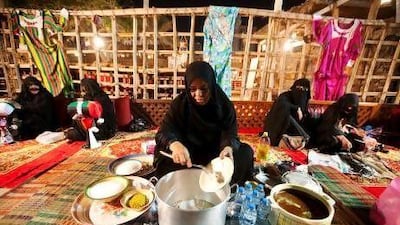SHARJAH // The world of the traditional Emirati housewife can appear somewhat enigmatic to the outsider - closed off and secret, glimpsed by only the few.
But to receive free personal tuition in cookery, crafts, doll-making and basket weaving from the ladies, all one need do is walk into a tent at Sharjah's 'Heritage Days' Festival.
In one corner of the tent, fashioned out of palm fronds and stalks, Fatima Al Mansouri tends to a massive silver pot full of a sizzling mix of oil and flour. She adds a bowl of spices and two bowls of white sugar before adding a final, secret, ingredient.
"Al Haba Al Hamra [red seed] is healthy, tasty if mixed well, and helps with digestion," explains Mrs Al Mansouri, who is in her 50s. "It was tradition to give this brew to women who just gave birth."
She is one of many women teaching every night until April 20. The women work from 4.30pm to 10pm daily, staying later on the weekends.
Mrs Al Mansouri is particularly popular, with young women from various backgrounds asking for her mobile number so they can get tips.
"Nowadays, most women don't know how to cook, and when they want a special feast for their husbands and friends, they call up their mothers," she says with a smile.
Mrs Al Mansouri has four daughters and "they tried" to learn traditional cuisine but don't have time.
"Modern women work and study. It is difficult balancing a traditional housewife role with the demands of modern society," she says.
Also in the tent is a row of a dozen Emirati women in their 50s and 60s, patiently sewing and weaving complicated patterns and designs.
Next to each one are younger Emiratis and festival visitors who watch on carefully, trying to copy their techniques.
"I love to sew, and this was my chance to learn from the best," says Badriya Esmaeel, an Emirati in her early 40s, learning from Sheikha Ramadan. Mrs Ramadan's station consists of a round sewing pillow piled high with rolls of thread in black, red, green and silver.
"I know how to sew and still find it hard to learn and do what these amazing women do," says Mrs Esmaeel. "It takes lots of patience, which most people these days don't have."
Mrs Esmaeel is learning the snakelike "Al Ghoul" pattern using "Al Tali" sewing techniques. The pattern has a distinct stripe woven from cotton threads and a golden or silver-coloured palm leaf, and sometimes includes threads of real silver and gold.
"Now we use nylon or artificial silver threads but before they were real and heavy metallic threads," says Mrs Ramadan. "It was a status symbol to be seen wearing clothes with Al Tali on them."
Watching the women cook and sew - and teach visitors how to make their own clothes, burkas and children's toys - it is clear that the traditional Emirati housewife wastes nothing and reuses everything for the sake of her home.
Leftover cloths and threads are used to make cushions and gifts.
Empty water bottles are cut up and filled with sand to be used as a stand for handmade dolls.
"Al Kura" dolls are made of white cotton and feature round, football-shaped heads. The dolls sit on top of the bottles, which are then covered up under the traditional Emirati clothes sewed on the dolls. The male figurines are dressed in white kanduras and traditional head gear, the females in colourful thoubs or dresses, with headscarves and burqas.
Workshops show visitors how to make the dolls and anything made at the event can be taken home.
Elsewhere in the tent are three Emirati women who call to shy observers, urging them to join in.
"Yala come, have a seat next to me, let me teach you our country's pride and heritage," says Mariyam Ali, as she braids strands of palm fronds for a basket. Next to her, Umm Abdullah and Halima Mohammed make Al Tali and encourage visitors to record them on their smart phones for later reference.
"We know it is hard and it can't be picked up in one session," says Mrs Mohammed. "We had a lot of time in our simple, traditional homes and spent our lives learning handicraft and traditional remedies and dishes. We can't compare ourselves with the new generation but it would be a shame for all these special crafts to be lost if they didn't at least try to learn them."
Prices for goods made by the women range from Dh200 for a children's dress to Dh700 and more for a woman's, depending on the design.
The talents of these housewives received little attention until recently, when initiatives by various heritage festivals across the UAE gave them a platform on which to shine.
"People generally look down on traditional housewives," says Umm Abdullah. "They don't realise we are the foundation of a happy home when it is filled with handmade things and good food made with love."

